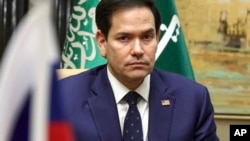South Africa will host a meeting of foreign ministers from the G20 group of major economies later this week, but the chief diplomat for the world’s largest economy, the U.S., is skipping it.
Secretary of State Marco Rubio announced on X earlier this month that he would not attend the meeting, taking place Thursday and Friday in Johannesburg, because he objected to the meeting’s agenda, which he described as anti-American.
He said South Africa was “using G20 to promote ‘solidarity, equality, & sustainability.’ In other words: DEI and climate change. My job is to advance America’s national interests, not waste taxpayer money or coddle anti-Americanism.”
DEI is short for Diversity, Equity and Inclusion, and in President Donald Trump’s first week in the White House, he signed an executive order to end DEI policies and hiring practices in the federal workforce.
“I think the whole topic of the G20 gathering is one that I don’t think we should be focused on, talking about global inclusion, equity, and these sorts of things,” Rubio later told the press.
He continued by saying the forum should be focused on issues “like terrorism and energy security and the real threats to the national security of multiple countries.”
The G20 is a group of the world’s 19 major individual economies as well as the EU and African Union. This year marks the first time an African country is in the rotating presidency position of the G20.
While Rubio will not attend, the South African government has confirmed the U.S. will still have a presence at the meeting, likely at a lower level.
South Africa’s Department of International Relations and Cooperation responded to Rubio in a statement saying: “Our G20 Presidency, is not confined to just climate change but also equitable treatment for nations of the Global South, ensuring an equal global system for all.”
Ronald Lamola, minister of international relations and cooperation, told local TV that the meeting’s agenda had been adopted by all members of the G20 and carries on the themes from previous summits, such as the one in Brazil last year.
Deteriorating relations
Even before the announcement that Rubio would not be taking part in the foreign ministers’ meeting, there had been a swift deterioration in U.S.-South Africa relations under the new administration in Washington.
President Trump accused South Africa’s government of engaging in land grabs and mistreating white minority Afrikaners. He cut U.S. financial assistance to the country.
While the South African government did pass a controversial land reform law earlier this year, no land has been seized. The white minority is still one of the country’s most privileged communities and owns the majority of private farmland.
Response from other G20 members
Several other nations were quick to affirm their attendance at the meeting after Rubio said he will not attend.
Those included EU members Germany, Italy and France, whose ambassadors to South Africa posted a joint video on X saying they were “united in diversity” and shared the South African government’s democratic values.
Russia also confirmed Foreign Minister Sergey Lavrov will attend.
“The priorities stated by the South African presidency are designed to encourage economic growth, reduce inequality and imbalances, and ensure equitable access to financing for countries in the Global South.,” said Russian foreign ministry spokesperson Maria Zakharova.
China likewise confirmed its commitment to the meeting, with ambassador to South Africa Wu Peng meeting foreign minister Lamola just after Rubio’s announcement and posting on X: “I also expressed China's readiness to support South Africa's G20 Presidency.”
Last week, Chinese foreign ministry spokesman Guo Jiakun, said in a press briefing,
“China stands ready to work with all parties to make this meeting a productive one, and send a strong message of supporting multilateralism, strengthening solidarity and cooperation, and jointly responding to global challenges,” he said.
Analysts weigh in
Political analysts said Rubio’s absence could provide space for countries hostile to the U.S. to advance their agendas.
“Will we see the increase of countries like Russia and China pushing their lines, their issues, their perspectives in the absence of the US? That’s entirely possible,” Steven Gruzd, from the South African Institute of International Affairs, told VOA.
Brooks Spector, a retired U.S. diplomat, said Rubio’s boycott of the meeting was “a serious misstep.”
“You get to make your points at a meeting, boycotting it simply means your voice is not heard,” he said. “Calling the meeting “anti-American” is a misunderstanding of the nature of bilateral, international and multi-lateral discussions.”
However, he said he expected Trump would likely still attend the major G20 summit in South Africa in November. In December, the U.S. will take on the presidency of the G20.





